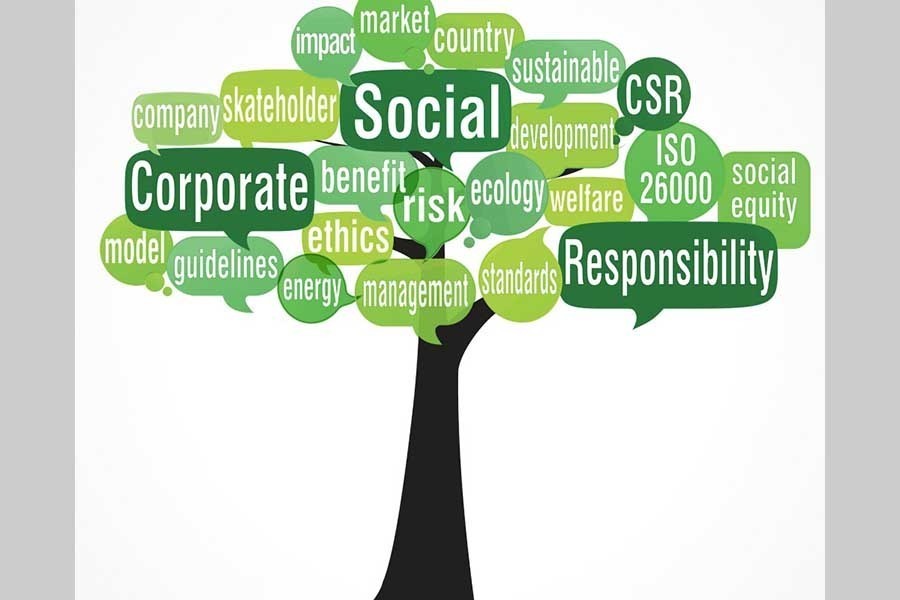The latest central bank guideline on corporate social responsibility (CSR) appears to have pointedly addressed some core areas needing greater support and intervention. Meant for banks and financial institutions, the BB guideline lays down strict ground rules in terms of fund allocation and areas where the fund should go. The guideline, not the first of its kind, is more specific than those issued in the past in devising the methods of CSR application.
The focus this time is more on healthcare and environment. All scheduled banks and non-banking financial institutions (NBFIs) of the country are to expend minimum 30 per cent of their total CSR funds, instead of the previous 20 per cent, to facilitate healthcare supports, according to the guideline. Spending for environment and climate change migration and adaption sector has been enhanced to 20 per cent of their total CSR funds, instead of the previous 10 per cent.
Ever since the Covid-19 pandemic began to wreak havoc with life and livelihood, mobilising resources to help address the situation has assumed a major priority for governments. All over the world, countries -- rich and poor -- have devised ways mostly in the form of dishing out cash as well as various packages to support the affected people. In Bangladesh, alongside the government's efforts to provide stimulus packages and cash assistance, a very suitable measure could be reinforcing CSR mechanism in a meaningful manner.
The issue of CSR in the country is often seen in terms of financial spending in a particular area of socio-economic or development activity. It is the state-owned enterprises and commercial banks that are primarily responsible for providing funds for CSR activities. So far, CSR in Bangladesh has remained confined to certain specific areas, and in doing so, it has not been practised in delivering directly for poverty reduction, or as is now the case, supporting livelihoods of millions. Now that the pandemic is feared to continue its onslaught -- who knows for how long -- finding ways to relieve the misery of the fast increasing number of vulnerable people cannot be overemphasised. The fresh surge in Covid infection cases may push the poverty rate up and that is why the need for spending CSR funds for the distressed, jobless, vulnerable, homeless and helpless people has become overriding.
Clearly, the purpose of CSR at this time is to drive a positive social change. Covid-19 has highlighted the need to have a more structured approach, with financial corporates playing a key role in mitigating public sufferings. But the debate to determine the effectiveness of any previous CSR efforts has thrown up several challenges: finding reliable implementing partners, monitoring and tracking funds, and assessing their impact. A Bangladesh Bank report showed that the scheduled banks spent close to Tk 5.17 billion in January-June 2020 as CSR fund against their spending of Tk 2.40 billion in the corresponding period of the previous year. However, it is not known where and how the money was spent.
Now, in order to render the recent BB guideline purposeful, it is important that a plan is drawn for the targeted socio-economic activities in order that actions can be taken in a sustainable manner. According to the BB guideline, any programme promoting job opportunities, self-employment and skill development for the youth can be funded from the CSR budget. No doubt a good attempt, this needs proper direction, and the BB can suggest ways. Needless to say, a good deal of success of these and other activities will depend on how effectively these are monitored, and in so doing, taking the stakeholders on board would hopefully yield better result.
Although CSR has been in practice in the country for sometime now, it is clear that its method and target are both narrowed down to financial allocations by state-owned enterprises and banks only. We hardly come to know whether corporate organisations follow CSR practices-- inside and outside their companies. If there is will, CSR activities can be best practised by businesses in their work culture. This in other words means millions of employees directly deriving benefit under the broad facilitating ambit of corporate welfare. It is in this context that CSR is a self-regulating business model that helps a company to be socially accountable to itself, its stakeholders and the public. By practising corporate social responsibility, also called corporate citizenship, companies can be conscious of the kind of impact they are having on all aspects of society including economic, social, and environmental. At a time such as now, engaging in CSR by corporates means their crucial role in redressing a calamity that has affected us all.
As regards the strong emphasis on environment in the BB guideline, it is clearly to mitigate a host of problems arising from climate change. It can hardly be overemphasised that health, energy, water supply, sanitation, industry, transport, trade, tourism, agriculture, forestry, fisheries, environmental protection and ecosystem, goods and services, and food security are the key development sectors of the country that are directly affected by climate change. So, it is important to see how effectively these areas are taken into account while allocating funds and taking up projects.


